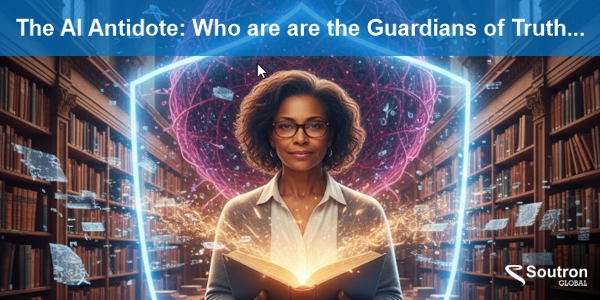Archive, Library and Museum Value in the Age of AI

Why Curated Collections Outperform AI-Generated Content
In an age where information is abundant but not always trustworthy, archives, libraries and museums remain a critical source of reliable knowledge. Free general-purpose AI systems are powerful, but they rely on data that has been published, collected, ingested and even ranked for relevance based on social media popularity. Unlike traditional curated collections, they do not guarantee that the information they generate is evidence-based or unbiased.
The legal profession in particular has been hit by their use of AI to prepare documents needed for court cases. Recently, a lawyer in California was fined $10,000 when case documents filed were found to cite 21 ChatGPT generated case quotes that were ‘hallucinations’, out of the 23 quotes provided. Further, per a recent article in Fortune Magazine, legal industry powerhouse LexisNexis is of the opinion that ‘it’s only a matter of time’ before attorneys lose their licenses over using open-source AI LLMs.
Curated collections held in archives, libraries and museums, by contrast, are authoritative sources of knowledge, designed to connect people with verified information. These collections hold a unique position in this new landscape. Authoritative collections, whether legal briefs, proprietary research, corporate knowledge or historical archives are often stored securely in databases not available for ingestion by AI engines. This means they protect valuable intellectual property while ensuring staff and researchers can reliably access accurate, organisation-specific knowledge.
Domain-specific AI Tools = Accessibility
Specialised AI tools are proliferating across sectors like law, health and other industries, typically operating on usage-based pricing models. While general-purpose AI platforms will likely continue offering freemium tiers, libraries have a unique opportunity to leverage their expertise by teaching users how to craft effective prompts. Even minor wording adjustments can dramatically alter AI-generated responses.
Just as libraries currently maintain subscriptions to specialised academic journals, they are expected to adopt domain-specific AI platforms, with costs varying by usage, volume and field. Today’s SaaS subscriptions in sectors like legal and healthcare range from GBP £15 to over GBP £400 per user monthly. The Zylo 2025 SaaS Management Index, reveals that mid-sized organisations spent an average of GBP £300,000 on AI applications in 2025. Forward-thinking libraries will invest in industry-specific AI tools tailored to their communities, not only providing access but also offering expert guidance on optimal query formulation.
Moreover, archivists and librarians provide what AI fundamentally cannot: context, guidance and critical evaluation. They help users navigate complex information ecosystems, authenticate sources and apply knowledge both ethically and effectively.
The Relevance of Libraries in the Age of AI
Libraries serve as:
- Guardians of verified knowledge in an era of AI-generated pattern-based misinformation. General-purpose LLMs generate text by predicting the most likely sequence of words, not by fact-checking against authoritative sources. This can lead to confident but incorrect responses.
- What if the right answer is not part of the pattern seen by AI and ignored? What if the LLM is influenced by popular answers and not authoritative ones? What happens when a previously generated AI response is used as an authoritative resource? All of this results in distorted realities, misrepresentations and misinformation.
- Secure repositories for proprietary information that remains inaccessible to general-purpose AI systems
- Essential validators and contextualises of AI-generated content
- Providers of AI literacy, how to ask the right questions and information discernment training
- Libraries cultivate critical thinking and deep research skills by teaching information literacy, helping individuals make informed, autonomous decisions rather than relying on algorithmic shortcuts.
In this sense, libraries provide a necessary balance to AI: where algorithms forecast possibilities, libraries secure facts; where AI predicts, libraries preserve.
These limitations underscore why libraries remain irreplaceable in the information ecosystem. They provide human judgment, professional expertise and institutional commitment to accuracy and diversity that AI systems, despite their impressive capabilities, cannot replicate. In an era where AI-generated content becomes increasingly sophisticated and prevalent, libraries serve as essential anchors of verified, contextual and ethically curated information.
Key Takeaways
AI systems and libraries serve complementary rather than competing roles. AI excels at providing quick, broad-based responses and can serve as an excellent starting point for research. However, libraries can provide critical verification, contextualisation and specialised access that ensure information accuracy and depth.
The most effective information strategy will combine both resources: using AI for initial exploration and broad overviews, while relying on libraries and domain-specific resource subscriptions for verification, specialised research and developing the critical thinking skills necessary to navigate our complex information landscape effectively.
Related Articles (link to other articles)
Explore how archives, libraries and museums continue to deliver unique value in the AI era. Read our article “5 Ways Archives, Libraries and Museums Remain Essential in the Age of AI” or download our Information Management e-Book for strategic insights on managing information effectively in an AI-driven world.
